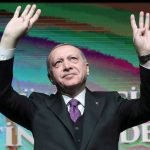 Turkish delight The owner of an antique shop in the Grand Bazaar in Istanbul sips a cup of Turkish coffee
Turkish delight The owner of an antique shop in the Grand Bazaar in Istanbul sips a cup of Turkish coffee
Coffee houses gave men somewhere to congregate other than in homes, mosques or markets, providing a place for them to socialise, exchange information, entertain – and be educated. Literate members of society read aloud the news of the day; janissaries, members of an elite cadre of Ottoman troops, planned acts of protest against the Sultan; officials discussed court intrigue; merchants exchanged rumours of war. And the illiterate majority listened in. In the coffee houses they were introduced to ideas that spelled trouble for the Ottoman state: rebellion, self-determination and the fallibility of the powerful.
It wasn’t long before the authorities began to regard the kahvehane as a threat. Some sultans installed spies in coffee houses to gauge public opinion; others, like Murad IV, an early-18th-century sultan, tried shutting them down altogether. But they were too profitable. When simmering nationalist movements came to a boil throughout Ottoman lands in the 19th century, the popularity of coffee houses burgeoned. Ethnic groups in European regions of the empire with an Eastern Orthodox Christian majority started agitating for independence. Nationalist leaders planned their tactics and cemented alliances in the coffee houses of Thessaloniki, Sofia and Belgrade. Their caffeine-fuelled efforts succeeded with the establishment of an independent Greece in 1821, Serbia in 1835, and Bulgaria in 1878. The reign of kahve was over.
The different nations added signature twists to the drink: Greeks make it with mastic, a plant resin; Croatians caraway seeds; Arabs infuse it with cardamom and serve it in small cups without handles called finjans. Even when taken sade, or plain, the flavour profile depends on the roast; the medium-to-darker beans of the Turkish variety produce coffee with an earthy taste, smoky notes and thick texture. When you drain your cup, you will see fine grains coating the bottom. The effects soon hit. Emperors of the world, beware.



